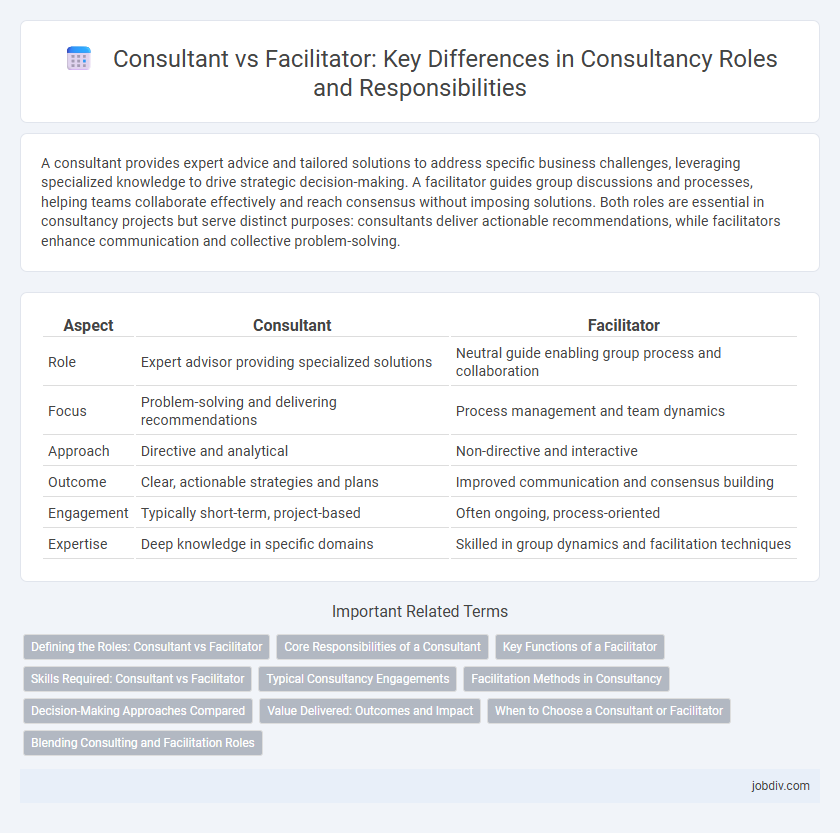A consultant provides expert advice and tailored solutions to address specific business challenges, leveraging specialized knowledge to drive strategic decision-making. A facilitator guides group discussions and processes, helping teams collaborate effectively and reach consensus without imposing solutions. Both roles are essential in consultancy projects but serve distinct purposes: consultants deliver actionable recommendations, while facilitators enhance communication and collective problem-solving.
Table of Comparison
| Aspect | Consultant | Facilitator |
|---|---|---|
| Role | Expert advisor providing specialized solutions | Neutral guide enabling group process and collaboration |
| Focus | Problem-solving and delivering recommendations | Process management and team dynamics |
| Approach | Directive and analytical | Non-directive and interactive |
| Outcome | Clear, actionable strategies and plans | Improved communication and consensus building |
| Engagement | Typically short-term, project-based | Often ongoing, process-oriented |
| Expertise | Deep knowledge in specific domains | Skilled in group dynamics and facilitation techniques |
Defining the Roles: Consultant vs Facilitator
A consultant provides expert analysis, recommendations, and solutions tailored to a client's specific challenges, leveraging specialized knowledge to drive decision-making and strategy implementation. A facilitator guides group processes, encouraging collaboration, communication, and consensus-building without imposing solutions, focusing on enhancing the efficiency and effectiveness of team dynamics. Understanding the distinction between these roles optimizes project outcomes by aligning expertise delivery with participatory problem-solving methods.
Core Responsibilities of a Consultant
A consultant analyzes organizational challenges and provides expert advice to improve business performance through strategic planning and problem-solving. They conduct comprehensive assessments, deliver actionable recommendations, and support implementation of tailored solutions. Their core responsibilities include diagnosing issues, designing frameworks, and driving measurable outcomes aligned with client objectives.
Key Functions of a Facilitator
A facilitator guides group discussions to ensure equal participation, clarifies objectives, and manages conflicts impartially, enabling collaborative problem-solving. Key functions include creating a safe environment for open communication, synthesizing diverse viewpoints into consensus, and keeping the process focused and efficient. Unlike consultants who provide expert advice, facilitators emphasize process management to help teams reach their own conclusions.
Skills Required: Consultant vs Facilitator
Consultants require strong analytical skills, industry expertise, and the ability to deliver strategic recommendations based on data-driven insights. Facilitators need exceptional interpersonal skills, active listening, and the capability to guide group discussions toward consensus without imposing solutions. Both roles demand clear communication, but consultants emphasize problem-solving, while facilitators focus on fostering collaboration.
Typical Consultancy Engagements
Consultants typically provide expert analysis and tailored recommendations based on industry best practices, delivering strategic solutions during consultancy engagements. Facilitators focus on guiding group discussions and fostering collaboration among stakeholders to co-create actionable plans. In consultancy projects, the consultant's role centers on expertise-driven problem solving, while the facilitator emphasizes process management and consensus building.
Facilitation Methods in Consultancy
Facilitation methods in consultancy emphasize collaborative processes that enable client teams to identify challenges, generate solutions, and make decisions collectively, contrasting with consultants who often provide expert recommendations. Techniques such as workshops, brainstorming sessions, and consensus-building activities foster empowerment and shared ownership of outcomes, enhancing client engagement and implementation success. This approach leverages facilitation tools to create environments conducive to open communication and critical thinking, driving sustainable organizational change.
Decision-Making Approaches Compared
Consultants provide expert advice and structured recommendations based on data analysis and industry knowledge, often leading decision-making processes with clear solutions and strategic plans. Facilitators guide groups through collaborative decision-making by encouraging dialogue, fostering consensus, and enabling participants to generate their own solutions, prioritizing inclusivity and shared ownership of outcomes. The choice between consultant-led and facilitator-led approaches depends on whether expert-driven precision or collective engagement is required for effective decision-making.
Value Delivered: Outcomes and Impact
Consultants deliver value by providing expert analysis, strategic recommendations, and tailored solutions that drive measurable business improvements and foster sustainable growth. Facilitators enhance value through guiding collaborative processes, enabling stakeholder alignment, and fostering collective decision-making that strengthens team cohesion and accelerates project outcomes. Both roles impact organizational success differently; consultants focus on delivering actionable expertise, while facilitators maximize value by cultivating engagement and shared ownership of results.
When to Choose a Consultant or Facilitator
Choose a consultant when expert analysis, strategic advice, and specialized knowledge are required to solve complex business challenges or implement specific projects. Opt for a facilitator to guide group discussions, foster collaboration, and manage team dynamics during workshops or decision-making processes that need consensus-building. Assess organizational goals, the nature of the problem, and desired outcomes to determine whether expert input or process management best fits the situation.
Blending Consulting and Facilitation Roles
Blending consulting and facilitation roles enhances project outcomes by combining expert analysis with collaborative group engagement. Consultants provide specialized knowledge and tailored solutions, while facilitators guide teams through structured processes to foster consensus and innovation. Integrating both approaches maximizes client value by delivering strategic insights and enabling effective team dynamics.
Consultant vs Facilitator Infographic

 jobdiv.com
jobdiv.com